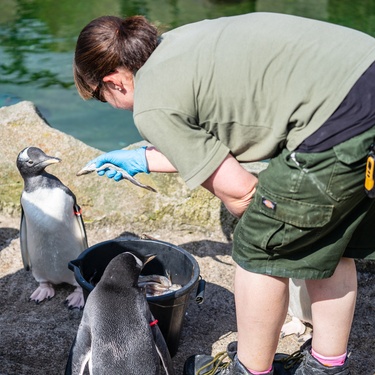
Zoos are more than just spaces to admire exotic animals—they are hubs for dedicated care tailored to the needs of each creature. Zookeepers don’t simply care for a group of animals as a whole. Instead, their approach focuses on the specific needs of every single animal, ensuring they live healthy, enriched lives in captivity. Here’s a closer look at how zookeepers provide individual care to animals and the incredible work that goes into providing this care.
Personalized Diets Tailored to Each Animal's Needs
Every animal in a zoo has unique dietary requirements that go far beyond generic feeding routines. Zookeepers work closely with nutritionists to create meals packed with the right nutrients, portions, and variety specific to the species or even the individual animal's health goals. For example, one tiger might need a higher protein intake due to muscle growth, while another might switch to a lighter diet to manage its weight. Food preferences are also taken into account, as some animals may reject certain items altogether. Adjusting these diets as animals age or as seasons change provides each animal with the nutritional balance it deserves.
Enrichment Activities Designed for Individual Behaviors
Mental stimulation is just as crucial as physical health, and that’s why enrichment programs are a big part of how zookeepers provide individual care to animals. These activities account for the instincts, behaviors, and interests of each species or individual animal. A bird of prey may engage in flight-based hunting exercises, while a bear might enjoy solving puzzles to access hidden snacks. The time of day also plays a role, as certain species are more active at specific hours. By observing each animal’s behavior closely, zookeepers can create unique and stimulating experiences to keep every animal mentally sharp and engaged.
Customized Healthcare Plans for Preventative Care
Preventative care is at the heart of keeping zoo animals healthy, and that goes far beyond vaccinations. Zookeepers work with veterinarians to devise healthcare plans tailored to each animal. Regular weigh-ins are key to tracking track overall health, and they are no small task for zookeepers, especially when it comes to weighing very large animals like hippos or buffalo. These weigh-ins can indicate whether an animal is underweight or overweight, allowing zookeepers to adjust their care accordingly. Routine check-ups catch potential health issues early, while dental cleanings, physical therapy, and medications are customized for the species and individual needs. Whether treating chronic conditions or preventing injuries, individualized healthcare reflects the dedication zookeepers bring to maintaining animal welfare.
Building Trust Through One-on-One Interaction
Successful animal care starts with trust, and zookeepers cultivate individual relationships with the animals in their care. Consistent one-on-one time allows the zookeeper to form bonds that allow for better observation and handling. Animals that feel comfortable with their caretakers are more willing to participate in things like routine health exams or voluntary training activities. Trust-based relationships also help animals adjust to new surroundings or companions more smoothly, offering them emotional support along the way.
Zookeepers create an exceptional standard for care driven by expertise and compassion. By meeting the unique needs of their animals, they help them thrive in environments that mimic, as closely as possible, the life they would experience in the wild. If you love animals and want to support the incredible work they do, explore ways to get involved with your local zoo.
Bio: Casey is a passionate copyeditor highly motivated to provide compelling SEO content in the digital marketing space. Her expertise includes a vast range of industries from highly technical, consumer, and lifestyle-based, with an emphasis on attention to detail and readability.




















